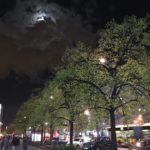On our birthdays, our grandmother liked to remind us that we were actually beginning the year of our future age. It was mostly in jest (you aren’t as young as you think, kid), but it was also a valuable way to shift my perspective towards the future and to help me appreciate the rapid passage of time. It’s a way to recognize that living isn’t simply about “turning” one year older, but in a sense you have to “earn” your new age with each accumulated day. As I turn 39 today, I also begin my 40th year on this earth. Starting daily reflections at the tail-end of my fourth decade seems appropriate, especially as I begin another phase in my life, not to mention that it’s high time to restart my personally beneficial writing habit.
Warsaw is a fascinating place, it’s populated by an eclectic cast of characters, which the recent war in Ukraine has only expanded. It’s a city with a long history, very difficult and dark in the mid-20th century, but also colorful and hopeful, especially in the last decade. It has been my home for half of the past decade, punctuated by trips back to California, and then a long, unexpected return to the once “Golden State” for over three years after a family health crisis. Every time I return to Poland’s capital on the Vistula, I feel greater fondness for it. Perhaps it’s the family connection, my great-grandfather had a tailor shop one block from where I live after he fled the Bolsheviks in Russia, or that my mom was born and raised there, living two blocks away from my apartment, the memory of nearly two years spent in Warsaw as a child 30 years ago deserves much of the credit for planting the seeds of my future infatuation with Varsovie.
There are many things about Warsaw that I find attractive, but the three that come to mind most are: the people, the cityscape and the history.
While Poles have been the majority of the city’s residents for centuries, there have always been other groups, the most visible these days are Ukrainians, especially women and children. The thing about Warsaw is that because it was virtually wiped out in 1944 and most its residents were either killed or exiled, a tiny minority of the people today are “Warszawiacy” (Varsovians) and even then, most of these only hail back to the immediate post-war period. Because so many Warsaw denizens are not from here, they’ve given the city a different character than other notable cities that weren’t destroyed and their people blown away, like Krakow. Though it wasn’t a conscious decision, I’ve fallen in with a group of English ex-pats, lovely chaps in the best sense of the word. Like me they’ve seen the decay of the land of their birth and saw in Poland (even in left-leaning Warsaw) an oasis of normalcy and cohesion that much of the West has lost. I’ve met politicians, diplomats, drunkard hobos, the son of an unexpectedly deceased billionaire, fellow “third-culture kids”, a former executioner of traitors for the Home Army, a hero of the Warsaw Uprising, the family members of Poland’s last communist leaders, and hundreds upon hundreds of normal people going about their lives. There’s nowhere else in the world, or even in Poland, where I could witness such strands of humanity woven together in an ever-changing tapestry of a city.
The stuff about the cityscape will until tomorrow, or another day. For now I will finish my glass of wine, pondering the raven that landed in front of me, curiously turning its head before making his exit towards the springtime sunset in the city on the Vistula.




